Business Or Company Rejection Letter
Dear [Applicant's Name],
RE: Rejection of Job Application
We appreciate the time and effort you invested in applying for the position of [Job Title] at [Company Name]. After careful consideration of your qualifications and the needs of our organization, we regret to inform you that we have decided not to proceed with your application.
Please be aware that this decision was reached after a thorough review of all candidates, and it does not diminish your skills, experience, or personal qualities. The competition for this particular position was intense, and we had to make difficult choices to select the most suitable candidate who closely aligned with our requirements.
We sincerely admire your interest in [Company Name], and we encourage you to continue exploring future opportunities with us. We value your skills and qualifications, and should another position arise that matches your profile, we would welcome your application. We encourage you to monitor our website and career portal for any such openings.
While we cannot provide individual feedback due to the high number of applicants, we encourage you to seek feedback from other professionals, mentors, or career advisors. Their insights may help you further enhance your qualifications and increase your chances of success in your future endeavors.
We understand that receiving this news may be disappointing, and we wish you the best in your job search. Please accept our sincere gratitude for considering [Company Name] as a potential employer. We believe you have valuable contributions to make to an organization, and we hope you find the opportunity that aligns with your career goals.
Once again, thank you for your interest in our company. We wish you success in all your future endeavors.
Sincerely,
[Your Name]
[Your Position]
[Company Name]
Professional Business Rejection Letter
Subject: Proposal/Request Declined
Dear [Recipient Name],
We sincerely appreciate your interest in collaborating with [Company Name] and thank you for submitting your proposal/request. After thorough review, we regret to inform you that we will not be moving forward with your proposal at this time.
This decision does not reflect on the quality of your work, but rather our current business needs and priorities. We hope to have the opportunity to collaborate in the future.
Sincerely,
[Your Name]
[Your Position]
[Company Name]
Casual Business Rejection Email
Subject: Your Proposal Status
Hi [Recipient Name],
Thanks for sharing your proposal with us. After careful consideration, we’ve decided not to proceed with your offer at this time.
We appreciate your effort and hope we can explore opportunities together down the line.
Best regards,
[Your Name]
[Company Name]
Formal and Official Company Rejection Letter
Subject: Formal Notice of Rejection
Dear [Recipient Name],
We are writing to formally notify you that your request/proposal submitted on [Date] has not been accepted by [Company Name]. This decision is final and based on an evaluation of our strategic and operational priorities.
We extend our thanks for your interest in collaborating with us and encourage you to submit future proposals as opportunities arise.
Respectfully,
[Your Name]
[Position]
[Company Name]
Creative Business Rejection Letter
Subject: Regarding Your Proposal
Dear [Recipient Name],
We loved the creativity and effort behind your submission. However, at this moment, it doesn’t align with our current business direction.
We encourage you to stay in touch and look forward to potential future projects where your ideas may fit perfectly.
Warm regards,
[Your Name]
[Company Name]
Quick and Simple Business Rejection Message
Subject: Proposal Declined
Hi [Recipient Name],
Thank you for your submission. Unfortunately, we are unable to proceed with your proposal at this time.
Regards,
[Your Name]
What is a Business or Company Rejection Letter and Why It Is Used
- A business rejection letter is a formal communication sent to decline a proposal, request, or business collaboration.
- It informs the recipient about the decision while maintaining professionalism and goodwill.
- The purpose is to provide clarity and prevent misunderstandings while keeping future opportunities possible.
Who Should Send a Business Rejection Letter
- Company executives, managers, or department heads responsible for decision-making.
- Procurement or business development teams reviewing proposals.
- Human resources for partnership requests or vendor selections.
- Administrative personnel authorized to communicate official company decisions.
Whom Should the Business Rejection Letter Be Addressed To
- Individuals or companies submitting proposals, offers, or collaboration requests.
- Potential vendors, suppliers, or contractors.
- Clients requesting services that cannot be provided.
- Partners or stakeholders whose requests do not align with current priorities.
When to Send a Business Rejection Letter
- After reviewing business proposals or requests and deciding not to proceed.
- When declining partnership or collaboration opportunities.
- Following formal applications for services, grants, or contracts.
- When internal priorities or resources do not permit engagement.
How to Write and Send a Business Rejection Letter
- Begin with a clear subject line indicating the outcome.
- Address the recipient professionally.
- Express appreciation for the effort and interest shown.
- Provide a concise reason for rejection if appropriate.
- End with polite closure and, when possible, encouragement for future opportunities.
- Choose delivery mode: Email for speed, printed letter for formal documentation.
Requirements and Prerequisites Before Sending a Business Rejection Letter
- Review the proposal or request carefully to ensure informed decision-making.
- Consult with relevant departments to confirm the rejection is final.
- Verify that the communication aligns with company policies and contractual obligations.
- Prepare any supporting documents or evaluations if needed for reference.
Formatting Guidelines for Business Rejection Letters
- Length: Concise, ideally 2–3 paragraphs.
- Tone: Professional, polite, and neutral; avoid negative or emotional language.
- Structure: Subject, greeting, acknowledgment of submission, rejection notice, optional reason, gratitude, closing.
- Mode: Email for general business communication, printed letter for formal or official correspondence.
- Etiquette: Maintain respect, clarity, and courtesy throughout.
Tricks and Tips for Writing Effective Business Rejection Letters
- Keep the message concise and clear to avoid confusion.
- Offer positive feedback when appropriate to maintain goodwill.
- Encourage future collaboration to preserve professional relationships.
- Avoid detailed criticism that may be misinterpreted.
- Use templates for repeated rejections to ensure consistency and efficiency.
Common Mistakes to Avoid in Business Rejection Letters
- Being overly negative or critical.
- Failing to acknowledge the recipient's effort.
- Using vague language that leaves room for misunderstanding.
- Delaying communication, causing unnecessary uncertainty.
- Forgetting to use proper professional formatting and tone.
Essential Elements and Structure of a Business Rejection Letter
- Subject Line: Clear and concise, indicating the purpose of the letter.
- Greeting: Address the recipient by name.
- Acknowledgment: Thank the recipient for their submission or request.
- Rejection Statement: Clearly state the decision not to proceed.
- Optional Reason: Provide brief explanation if appropriate.
- Gratitude or Encouragement: Express appreciation and open door for future opportunities.
- Closing: Professional sign-off with name, position, and company.
After Sending a Business Rejection Letter
- Keep a record of the rejection for internal documentation.
- Ensure the recipient has received the communication.
- Be prepared to respond to follow-up inquiries professionally.
- Maintain a polite tone in any subsequent interactions to preserve relationships.
Pros and Cons of Sending a Business Rejection Letter
Pros:
- Provides clarity and transparency.
- Maintains professionalism and company reputation.
- Helps manage expectations and prevent misunderstandings.
Cons:
- May disappoint recipients and potentially strain relationships.
- Risk of negative feedback if tone is not carefully managed.
- Requires careful wording to balance honesty with courtesy.
Compare and Contrast Business Rejection Letters with Other Communication Methods
- Rejection letters vs. verbal communication: Letters are formal, documented, and reduce misunderstandings; verbal declines may be quicker but less formal.
- Rejection letters vs. automated rejection emails: Personalized letters demonstrate respect and professionalism, whereas automated messages may feel impersonal.
- Alternative approaches include providing conditional feedback or suggesting alternative opportunities.
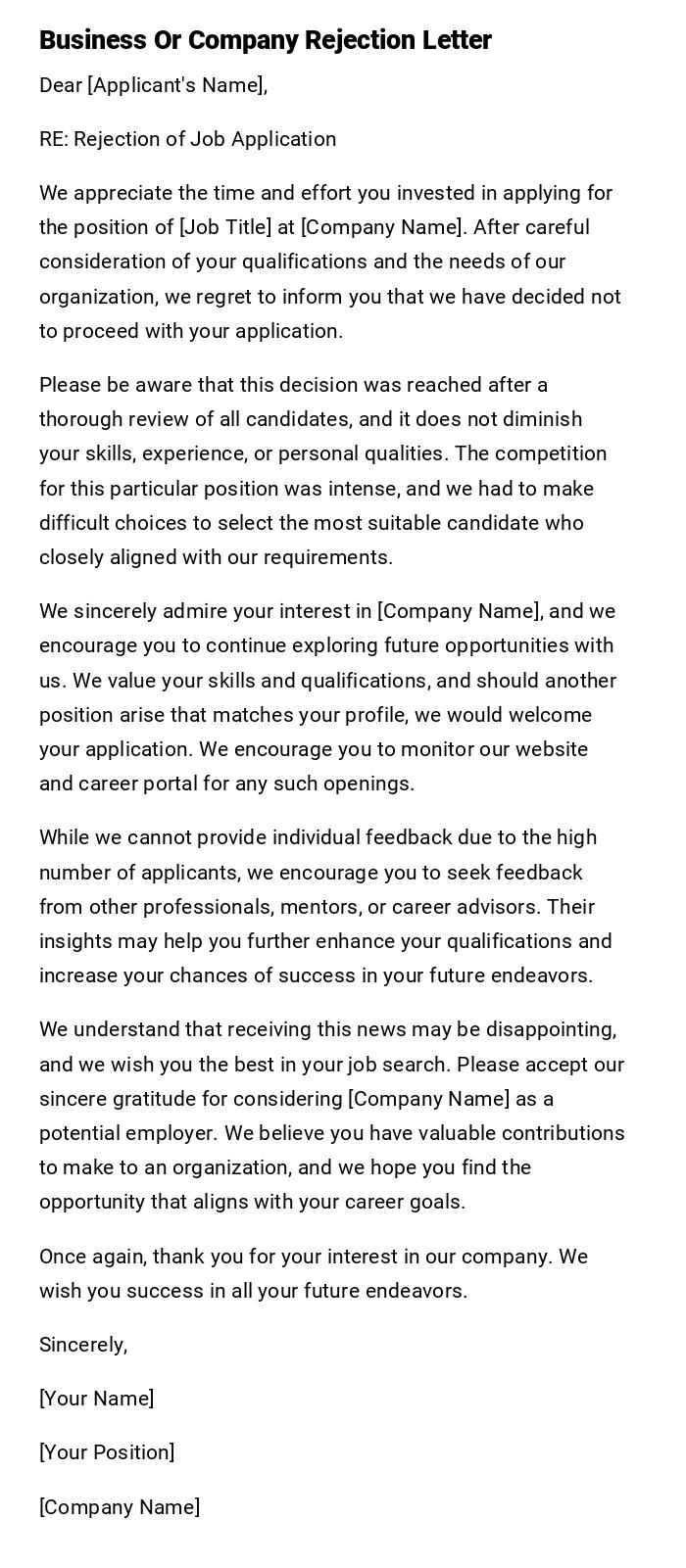
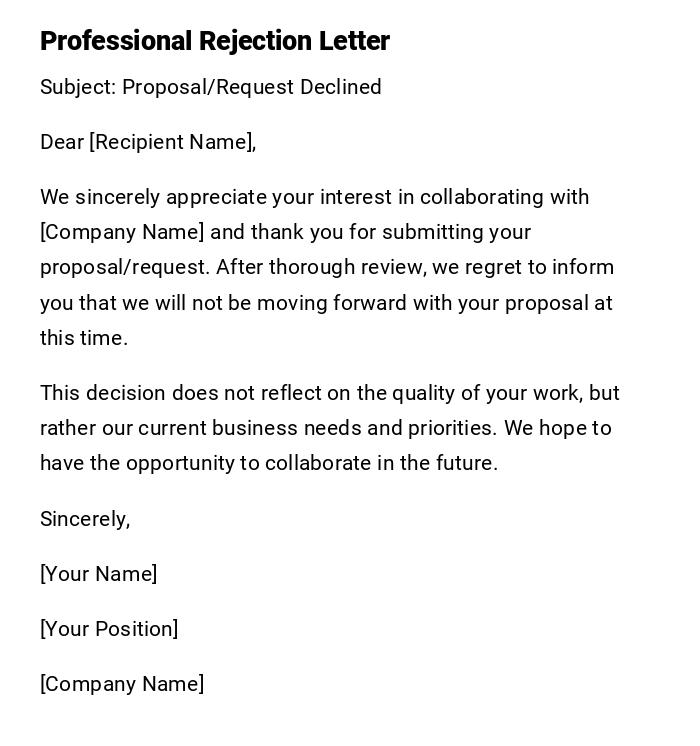
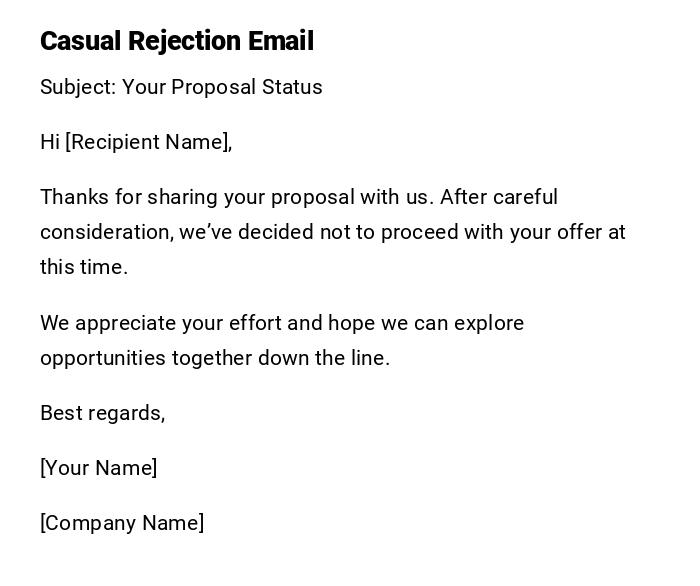
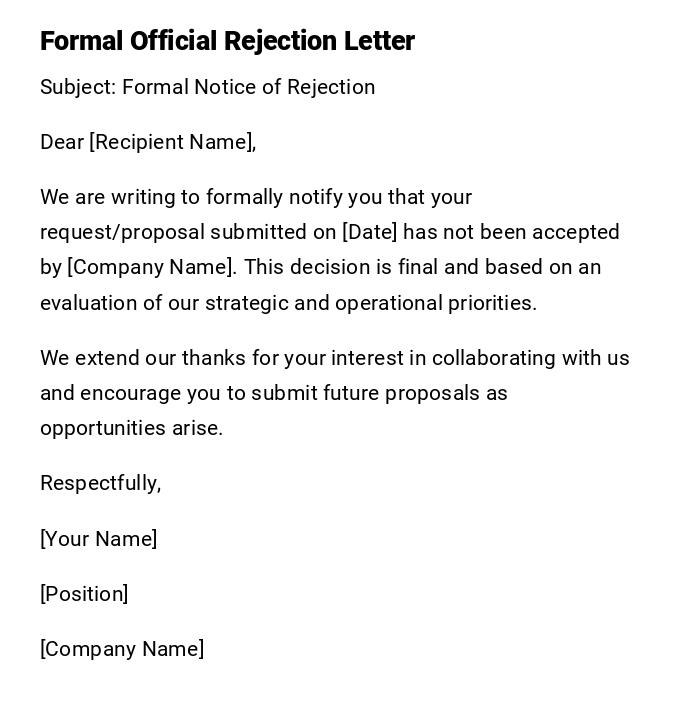
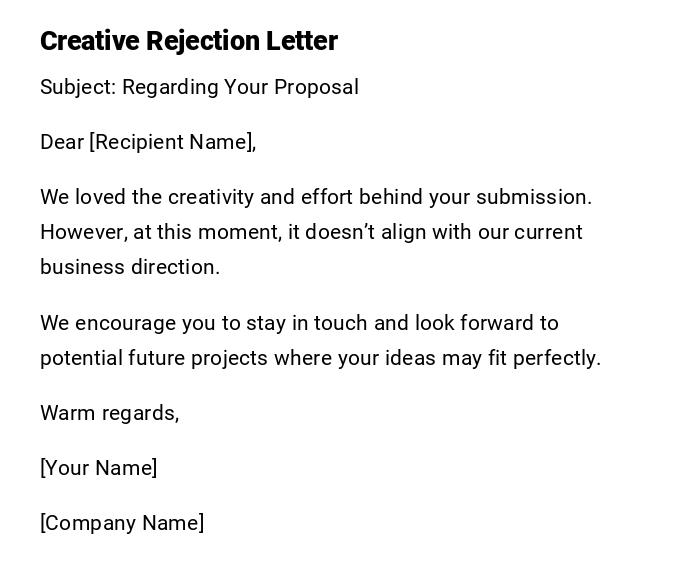
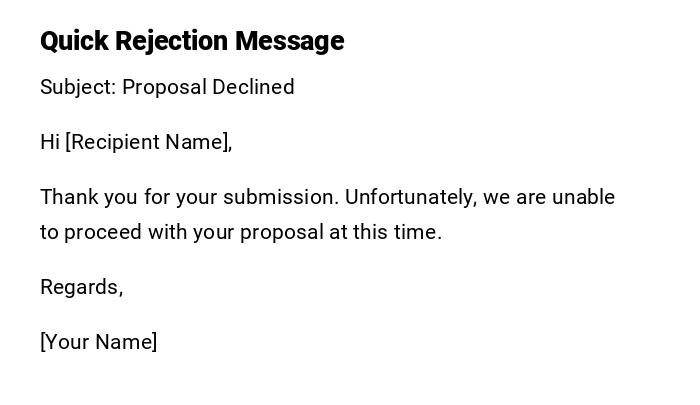

 Download Word Doc
Download Word Doc
 Download PDF
Download PDF